Syllabus and Strategy to study History for UPSC CSE Prelims | History for UPSC CSE PDF Download
It is clear from the subject-wise trend of prelims that history is one of the major favorites of UPSC and a lot of questions are asked from this subject. Questions from heritage, art & culture are also a part of ancient history that is asked in UPSC prelims.
The history portion of UPSC IAS Prelims Exam General Studies Paper I Syllabus encompasses questions from Ancient, Medieval, and Modern Indian History and Indian art and culture.
Importance of History as a subject in UPSC
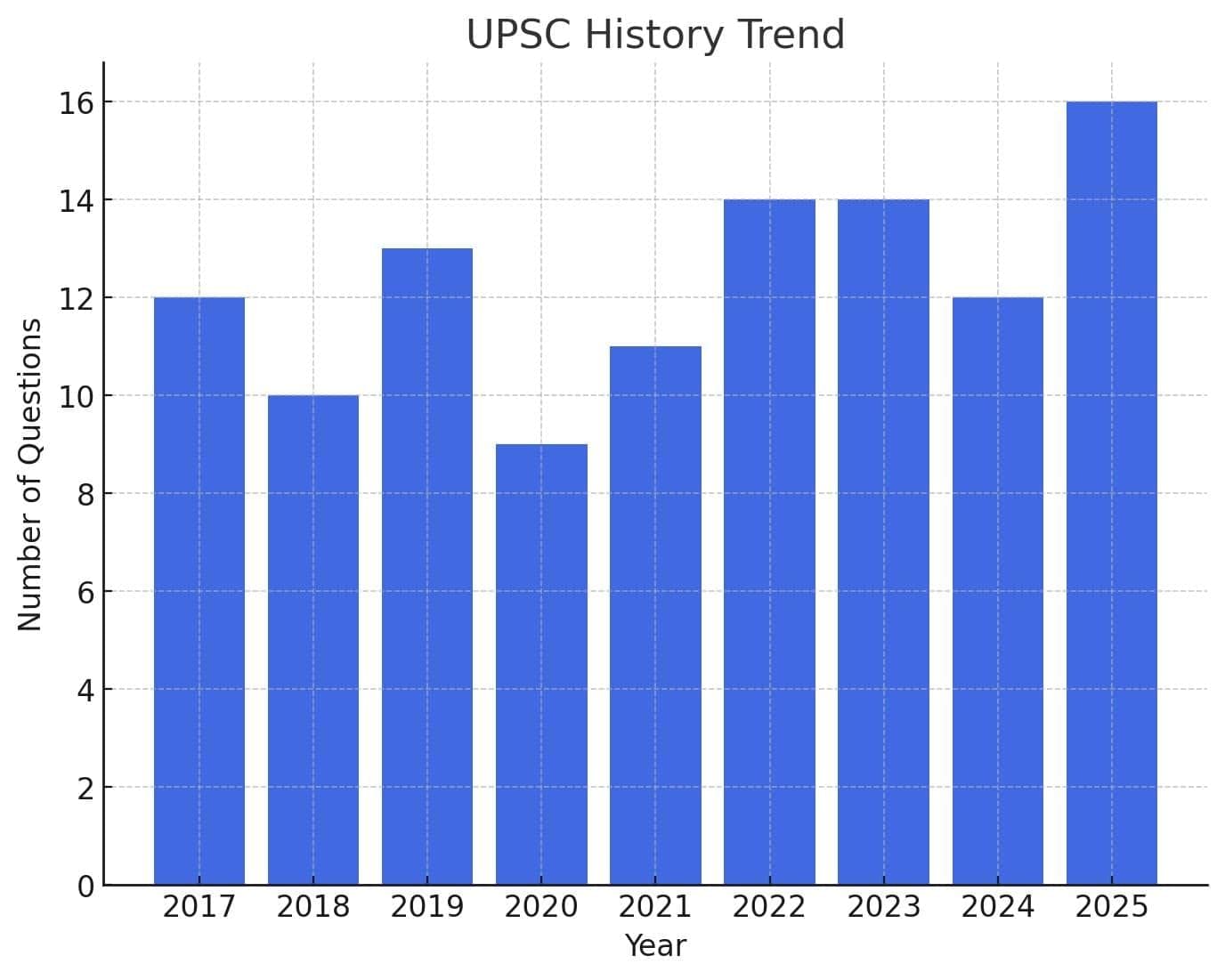 History as a module in General Studies has the most weightage in UPSC ranging around 20 to 25% in prelims and 40% weightage in GS PAPER 1 in mains examination. It would help if you prepare this topic properly as such weightage gives a good chance for your selection in the exam.
History as a module in General Studies has the most weightage in UPSC ranging around 20 to 25% in prelims and 40% weightage in GS PAPER 1 in mains examination. It would help if you prepare this topic properly as such weightage gives a good chance for your selection in the exam.
How to Prepare for History
EduRev's team has mentored thousands of students in the last 3-years, including Anudeep Durishetty (AIR 1 UPSC CSE), Swati Sharma (AIR 17, UPSC CSE) , and one thing that was common among all the toppers is the strategy that they had to prepare for the exam. So, keeping that in mind, we wish to provide you with relevant information as a UPSC Aspirant, helping you to devise your strategy, which would save tonnes of your valuable and limited time and ensure that you get great marks in the exam by studying what actually matters in the preparation.
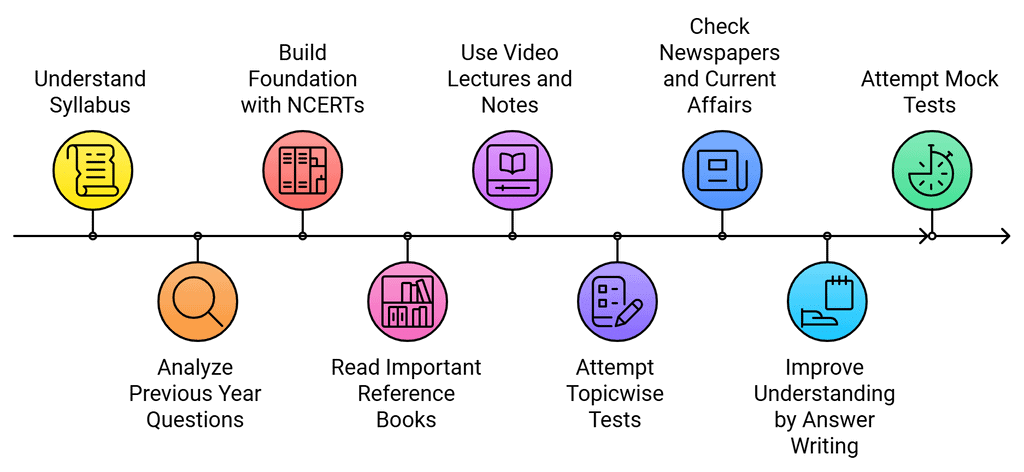
Step 1: Understand the Syllabus of History
UPSC has mentioned the History of India and the Indian National Movement in the syllabus which is divided into: 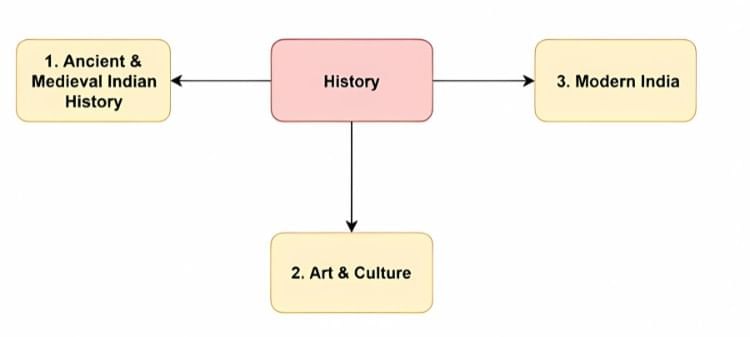
EduRev team has done the research from previous year papers, notes from the best coaching institutes and books recommended by the toppers to compile the syllabus for you:
1. Ancient History:
Recurring Important Topics in UPSC Prelims: Pre-Historic Times, Vedic Period (Rig and Later Vedic), Mauryan Empire, Post-Mauryan Period (including Kushanas and Satavahanas) and Gupta Empire
Other Important Topics : Indus Valley Civilization, Jainism & Buddhism, Mahajanpadas,
2. Medieval History:
Recurring Important Topics in UPSC Prelims: Regional States, Pallavas , Delhi Sultanate and Mughal Rule
Other Important Topics: Cholas and South-Indian Kingdoms, Marathas and the Other Indian States, The decline of the Mughal Empire, Vijaynagar Empire & others.
3. Art & Culture:
Recurring Important Topics in UPSC Prelims: Religion in India, Indian Literature, Ancient Art and Architecture, Temple Architecture
Other Important Topics: Sculpture, Paintings, Pottery Tradition, Numismatics, Performing Arts, Religion and Literature, National and Regional Festivals & others.
4. Modern India History:
Recurring Important Topics in UPSC Prelims: Constitutional and Legal Developments under British Rule, Evaluation of British Policies in India, National Movement before Gandhi, Emergence of Gandhi in the National Movement, Towards Quit India Movement
Other Important Topics: Advent of Europeans, Revolt of 1857, Peasant Movements, Revolutionary Nationalism, Indian National Movement-I (1905-1918), Indian National Movement-II (1918-1929), Indian National Movement-III (1930-1947), Governors-General and Viceroys of India, Constitutional Development of Indian Constitution & others.
These areas form the backbone of UPSC’s approach to Modern Indian History and should be prioritized for both factual clarity and conceptual understanding.
Step 2: Analyze Previous Year Questions (PYQs)
Once you’re through the syllabus, pick up the previous year's papers and skim through them to get an understanding of what is actually asked in the exam.
- Look for the source that gives topic-wise questions of previous years. So that you can have a complete understanding of each topic and the type of questions asked.
- You can get the last 10-years of UPSC Prelims & Mains papers from here - UPSC Previous Year Question Papers.
- You can also refer to the topic-wise questions of History and Art & Culture from the last 25-years here.
Step 3: Build your Foundation: NCERTs
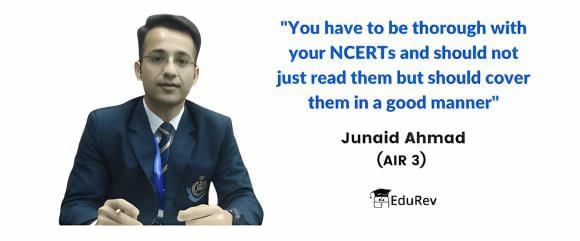
- Read NCERT books thoroughly to build your foundation
- Old NCERTs: Old NCERTs of RS Sharma for Ancient History, Satish Chandra for Medieval History & Bipan Chandra for Modern History will make you good to go for the exam.
- You can find all Old NCERTs under Must Read (Old & New) NCERTs for IAS Preparation course on EduRev, available here
- Fine Arts NCERT Class 11: Fine Arts NCERT Class 11th is a recommended book as well for Art &Culture & can be found here
- If you’ve ample time and interest in History, you should read all the NCERTs from Class 6 to Class 12 and not just Class 11, 12 NCERTs.
- NCERT Based Tests: Attempt NCERT based tests to test your learnings and strengthen your foundation.
- NCERT Summaries: Read Chapter Wise & Subject Wise NCERT summaries for quick revision.
Step 4: Read Important Reference Books: Spectrum, Nitin Singhania & Others
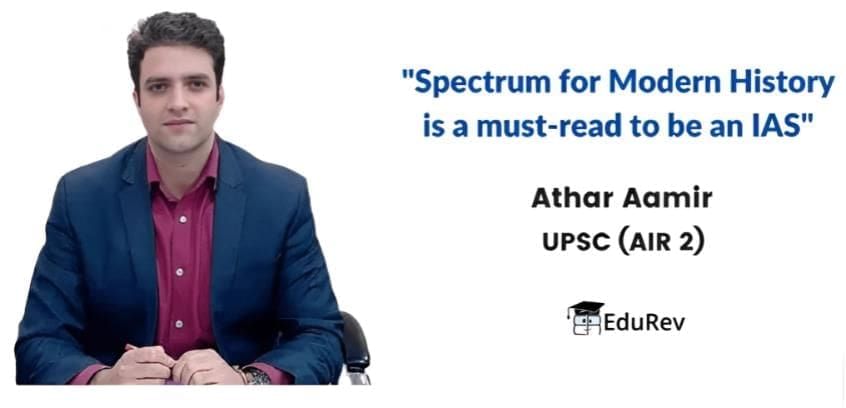
- TN Board Books: Tamilnadu Board books for class 11 and 12 are a good and recommended source to study Ancient- Medieval History. Books of Tamil Nadu Board can be found here: Tamil Nadu Board History Book: Class 11,
Tamil Nadu Board History Book: Class 12 - Read either NCERT books of 11th and 12th or Tamil Nadu Board Books. Do not try to read both. That would be waste of time as you have to cover so much syllabus.
- Nitin Singhania for Art and Culture: Notes of Nitin Singhania book will cover everything in Art and Culture Portion and you will be good to go. Notes of Nitin Singhania are more concise and should be read. You can find notes (summaries) & MCQ tests of Nitin Singhania here
- If you have time and like the subject of Art and Culture then you can go for Nitin Singhania Book too.
- Spectrum for Modern History: Tables given in Spectrum for Modern History towards the end of the book are important for keeping important points in mind. Go through summaries & MCQ tests after every chapter available here
- Lucent GK Book: Lucent GK Book is a very good book as far as history, geography, and science preparation from prelims point of view is concerned. Study this book at least twice to get hold of factual knowledge or facts at one concise place.
- Around 40 pages of Lucent Book are there for Modern India covering everything very concisely for a quick revision.
Step 5: Perfect Your Concepts through Video Lectures & Detailed Notes
- Once you've studied all the mentioned books, you should refer to any one source of notes & video lectures which will help you to strengthen the concepts and understand the same topic from a different perspective.
- This will give you a fair idea about the type of questions being asked in recent years. It will also help you in revising effectively and efficiently.
- Regular revisions through notes and video lectures can help strengthen the basics and boost one’s confidence in the subject. You can get topic-wise compiled notes & video lectures in the Indian Polity course on EduRev, available on this link.
Step 6: Attempt Topicwise Tests
- Regular revision through Topicwise Tests can give a real boost to your preparation.
- MCQ Tests on all the topics (& sub-topics) of history subjects are helpful for clear understanding, proper practice, and quick revision.
- These tests will help you in self-evaluation and you can check, whether you've understood a topic completely.
- You can get topic-wise tests in the History course on EduRev, available on this link.
- You can get previous year papers of UPSC Prelims & Mains here.
- And questions from last 25-years of UPSC prelims are arranged topic-wise here.
Step 7: Keep a Check on Newspapers & Current Affairs
- Though History is not related to current affairs but you should keep a check on the historical & cultural events being discussed in news.
- You should definitely refer to the monthly compilation of Culture related news under the Monthly Current Affairs available here.
- In general, stay updated with current affairs from Current Affairs & Hindu Analysis: Daily, Weekly & Monthly course on EduRev and attempt daily MCQ tests of daily current affairs.
Step 8: Improve Your Understanding by Answer Writing
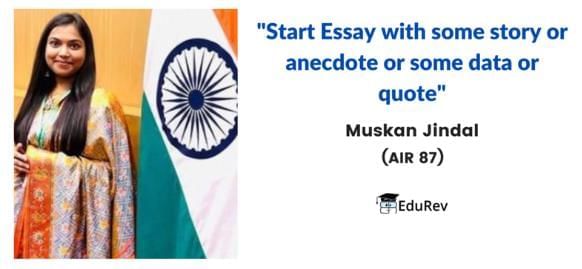
- As the pattern of the paper is evolving the candidate's horizontal expansion of the knowledge as well as the vertical limit of understanding of the topic is expected in a balanced proportion.
- There are a number of events happening around the year and the candidates have to take a close watch on the current scenario and recommend monthly current affairs for better understanding on the same.
- EduRev’s course on Essays provides you with sample essays to help you understand the pattern of essays.
- You should keep practicing by making your notes around various topics.
Step 9: Attempt Mock Tests of History
Attempt mock tests to understand your level of preparation and for self-evaluation. You can find subject-wise mock tests of History in the UPSC CSE Prelims Mock Test Series.
EduRev has provided all the study material & tests which matters in your preparation for UPSC, compiled under multiple courses. You can refer to this document “How to study History using the EduRev App? ” to understand it better & ace the exam smartly.
Other Important Links
1. Courses for all the subjects with detailed notes, video lectures & tests are available on EduRev:
History for UPSC CSE, Geography for UPSC CSE, Indian Polity for UPSC CSE, Science & Technology for UPSC CSE, Economy for UPSC CSE & others.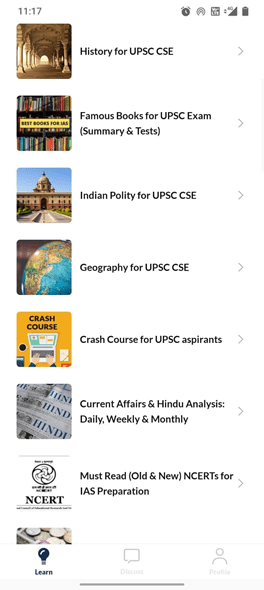
2. Check-Out subject wise Syllabus, Booklist & Strategy from these links:
- Syllabus, Booklist & Strategy to study Geography for UPSC - CSE Prelims
- Syllabus & Strategy to study History for UPSC - CSE Prelims
- Syllabus & Strategy to study Science & Technology for UPSC-CSE Prelims
- Syllabus & Strategy to study Indian Polity for UPSC - CSE Prelims
- Syllabus & Startegy to study Indian Economy for UPSC - CSE Prelims
- Syllabus & Strategy to study Environment for UPSC-CSE Prelims
Happy Learning with EduRev!
|
110 videos|653 docs|168 tests
|
FAQs on Syllabus and Strategy to study History for UPSC CSE Prelims - History for UPSC CSE
| 1. Why is History an important subject in the UPSC exam? |  |
| 2. What is the syllabus for History in the UPSC exam? |  |
| 3. How can I effectively analyze Previous Year Questions (PYQs) for History preparation? |  |
| 4. Which are the recommended reference books for History preparation for UPSC? |  |
| 5. How can I improve my answer writing skills for History in the UPSC exam? |  |

















